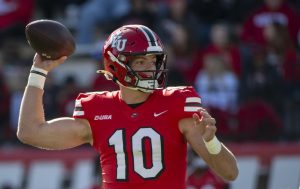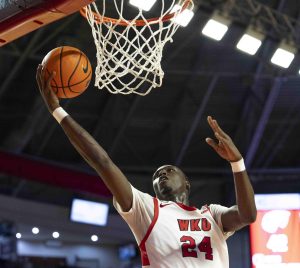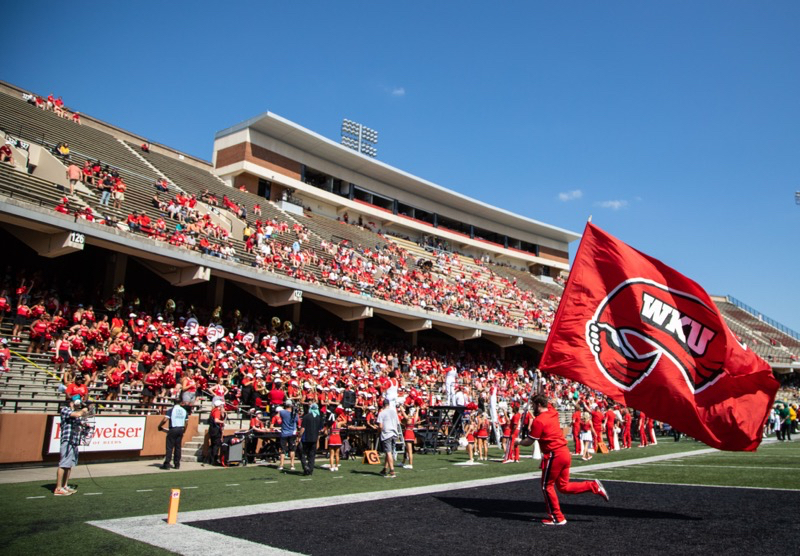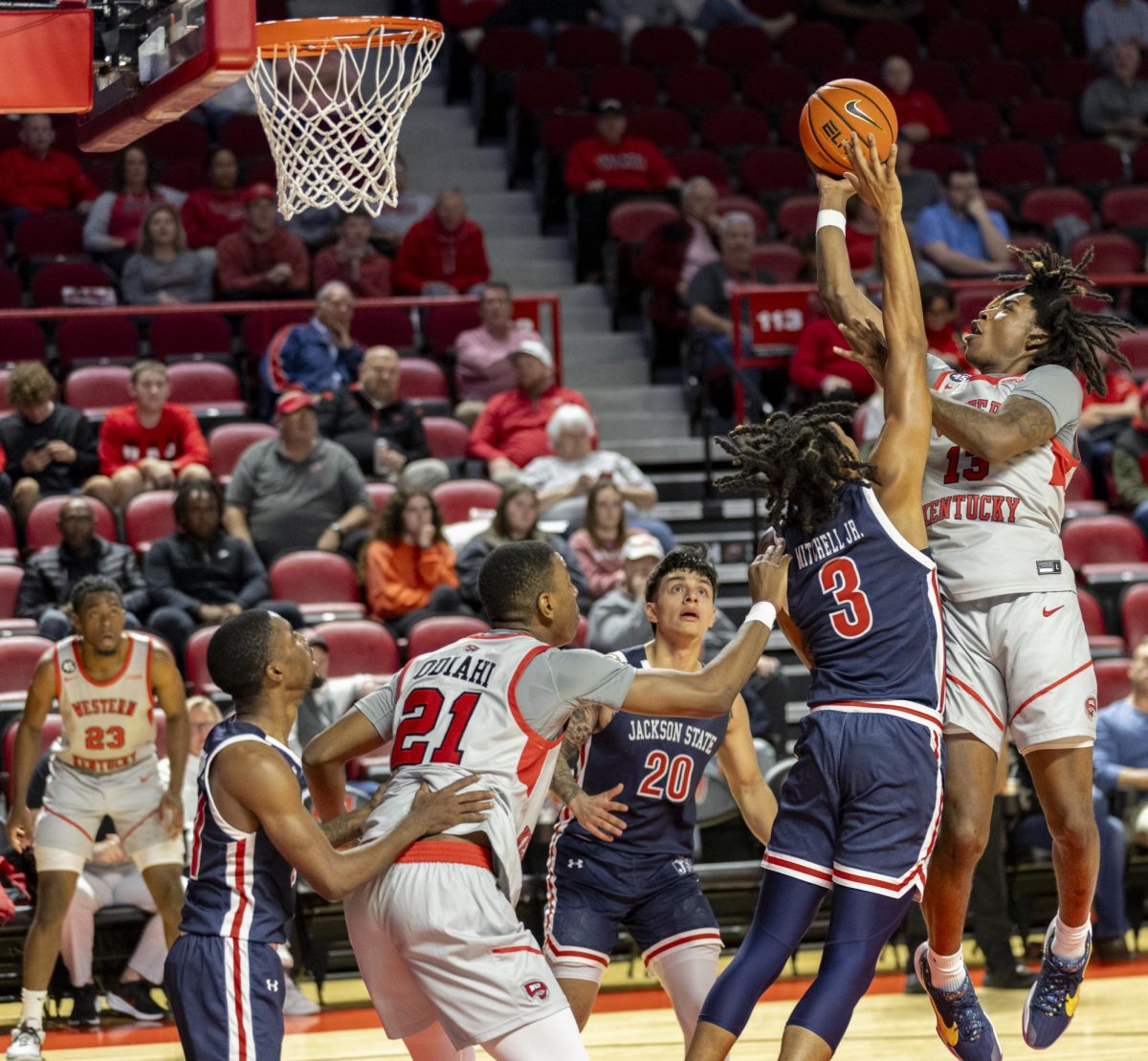Q & A with indie forefather, musician Calvin Johnson
March 20, 2017
Olympia, Washington-based musician, songwriter, record producer, disk jockey and record label creator Calvin Johnson performed at the FFOYA House in Bowling Green on Thursday, March 9. Performing under the moniker Selector Dub Narcotic, Johnson performed songs off his latest album “This Party Is Just Getting Started.” The show included performances by local artists The Cartoons and Penny Sheets.
After getting his start by working for community radio stations, Johnson became a major figure in the development of indie and lo-fi music through his formation of bands, such as Beat Happening, The Halo Benders and the Go Team. Johnson created the influential indie label K Records in 1982, with a roster including acts such as Modest Mouse, Beck and The Microphones.
Johnson is currently touring the United States and made time before his Bowling Green show to talk to the Herald about his latest album, his current live setup and his love for community radio.
I’d like to start by talking about your show on Thursday. You’re playing at the FFOYA House, what do you like about playing house shows as opposed to conventional rock clubs and things like that?
Well, I play all sorts of venues. I play art galleries, coffee shops, auditoriums, parks. I like to play non-conventional venues just because it shakes people up a little bit. It’s an environment where they’re not going to get the same old thing, and hopefully my music isn’t the same old thing. And I think people respond differently because they are more open to things when they’re entering a new environment. But also, the most important issue to me really is accessibility. I play shows that are accessible to all ages, so a lot of rock clubs automatically just don’t qualify.
Your latest solo album is under the moniker Selector Dub Narcotic, what is it about this record that made you want to go under that moniker as opposed to just Calvin Johnson?
Well, I had already been working under this name for a long time as a DJ and as a producer, and K released a Northwest hip hop compilation a couple of years ago, called “All Your Friend’s Friends,” which was produced by Smoke M2D6, and I started working with them around that time, and we really enjoyed the collaboration, and it just blossomed into an album at some point.
Can you tell me a little bit about the direction of the album? It seems a lot more electronically-oriented than some of your other work, how did that come together?
It’s really just Smoke’s direction. The album that he did, “All Your Friend’s Friends,” was a Northwest hip hop compilation that was entirely constructed out of samples from different K releases. So, he took drums from LAKE or Jeremy Jay or The Make-Up and different parts from different songs, and reconstructed and recreated beats and then different Northwest hip hop artists did their thing over them, the MCs.
So, that’s how we started. He had a beat that was constructed out of a song by a band called Mahjongg, and I’m a big fan of Mahjongg, of course. So, I started working on that. He would be like “hey, what else you got?” And I would go “oh, I’ve got this song,” and we would just start working on it. He has an incredible library of things he’s collected over the years; he’s recorded a lot of guitarists, drummers, bass players, keyboardists. And he chops them up and files them away. So, the samples, even though they’re samples, they’re all things that he recorded himself. And we just brought in different people from LAKE and other K artists, K bands to play. Chris Sutton, who’s in Hornet Leg, and different people came in and were like the session musicians for the record. So, there are samples, but there are a lot of live instruments too.
What’s your current live setup like?
It’s just your dreaded and inevitable laptop setup with a keyboard controller thingamajiggy. It’s really just me working with the beats that were created by Smoke and myself. And plus, I throw in a couple other things that aren’t on the album. I had some beats that I had been working with and threw those together. It’s the album plus a few other things.
How did you go about crafting the set list for these shows?
It’s all improvised. I don’t really have a set list, I just go in, and I’ll start playing. Every night is different.
How’s the reception been to this tour so far?
We’re having a great time. People are dancing, and it’s just fun.
Are there any limitations or freedoms playing in this format as opposed to with a band or playing by yourself acoustically?
It took me a little bit to get used to this format, but it’s been really liberating. It’s a lot of fun. I think one of the things about it is that Smoke’s direction is very accessible. It’s very immediate; people are just like “oh yeah” and just get into it. When I’m playing solo or with some of the bands I’ve been in, it takes a little bit more for people to find their place in the music.
How do you see community and college radio as a force of turning people on to new music as opposed to when you first started?
People are definitely more aware of community radio and non-commercial radio. And they’re more accepting of it than when I first started. Public radio was just seen as kind of boring and bland, and people didn’t even know about it or listen to it, and now it’s a lot more of the go-to stations for a lot of people. It’s much more established, and it’s a lot more integrated into people’s lifestyles.
It’s still a meeting ground for people who are interested in music. It’s still a place where people who are interested in weird stuff or a particular kind of music find each other. Both the programmers and the employees, the people that work there, but also the listeners. So, it’s just a meeting place.
When you’re producing, or collaborating with other artists, is there a line you tow between employing your own sensibilities versus the vision of the artist you’re collaborating with?
When I’m collaborating on the music, it’s really a system of trust. We trust each other’s judgement, taste and ideas. But when I’m more in the production role, where I’m just recording artists, I’m really just trying to document what they’re doing, and it’s not as collaborative. It’s more of just being a recording engineer. So, it really just depends.
Do you have any idea what you want to do after this tour? Would you like to record again as Selector Dub Narcotic?
Smoke and I have already started collaborating for the next album. I have a couple songs that I’m playing that I’m experimentally trying out for the next record.
Do you think the record will be released this year?
I don’t know. I don’t want to say because things just never work out the way you plan them. I’ll get back, I’ll work on it, and it will come out when it’s ready. But it would be great to have it out before the end of the year.
In your early days of playing with Beat Happening, I hear a lot of things about how there was a hostile reception when you were playing with more hardcore acts like Fugazi. Is that overblown?
The hostility wasn’t necessarily from the hardcore people. I think that that has been overemphasized. The hostility was really more from just the normal people. Normal people were like “what is this shit?” I think that when you’re talking about later, like in the late 80’s and early 90’s, hardcore people were the normal people. That was normal to them. So, we were weird because we weren’t hardcore. But mostly when we first started it was the hardcore people that liked us.
When you received that kind of reception, did that ever discourage you?
You know, people pay their five dollars, they can do whatever they want.
What recommendations would you have for someone who would maybe want to start their own label or someone who just wants to get their music out there and heard?
Just go for it. Just do it. Make some music. Put it out there. It’s easier now than ever. Get on Bandcamp and let it rip.
Reporter Andrew Critchelow can be reached at 270-745-6288 and [email protected].










